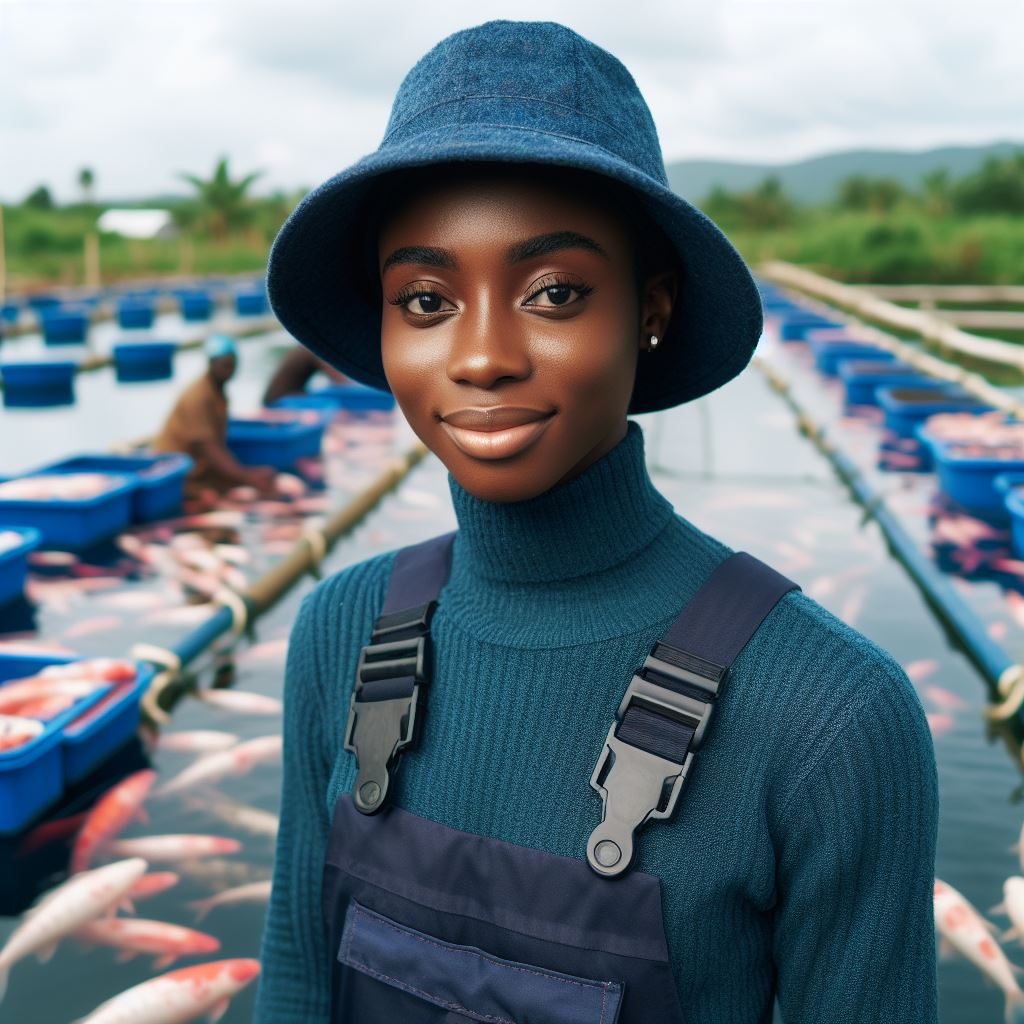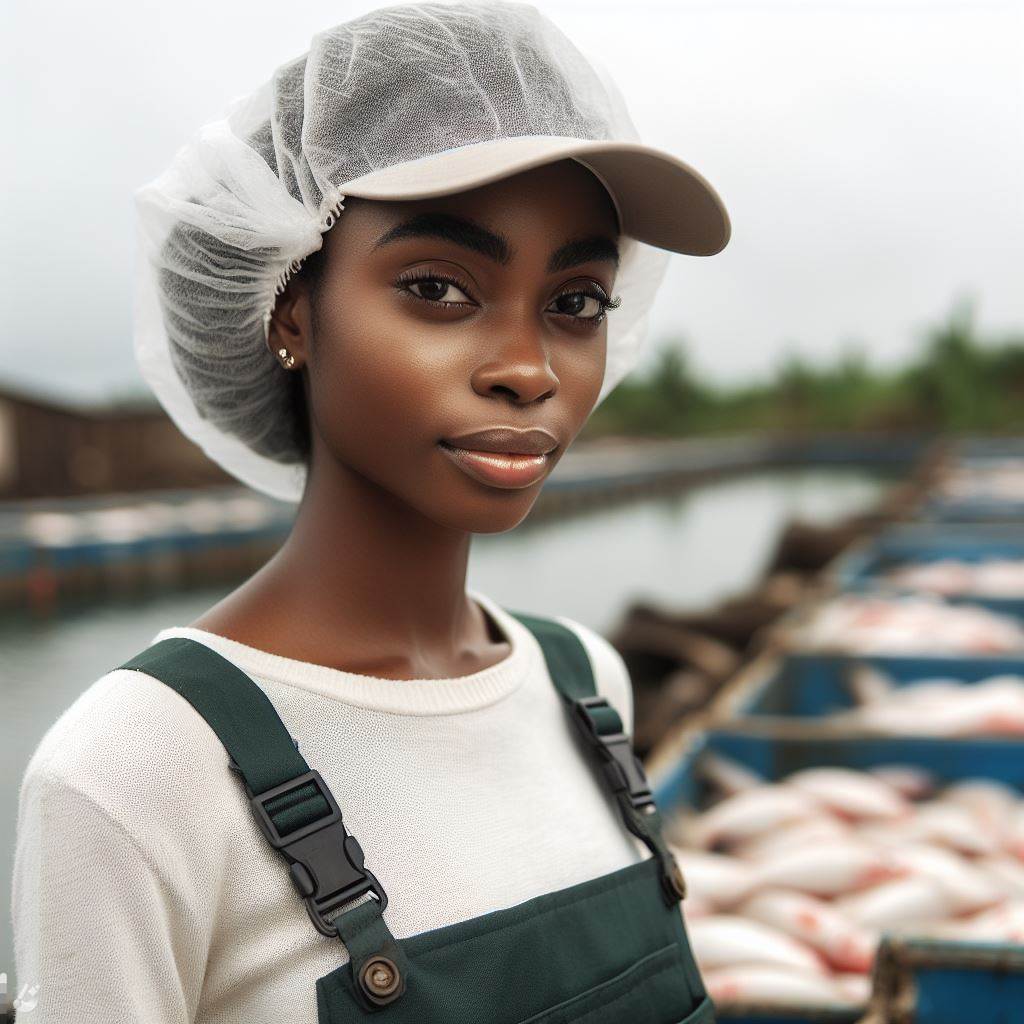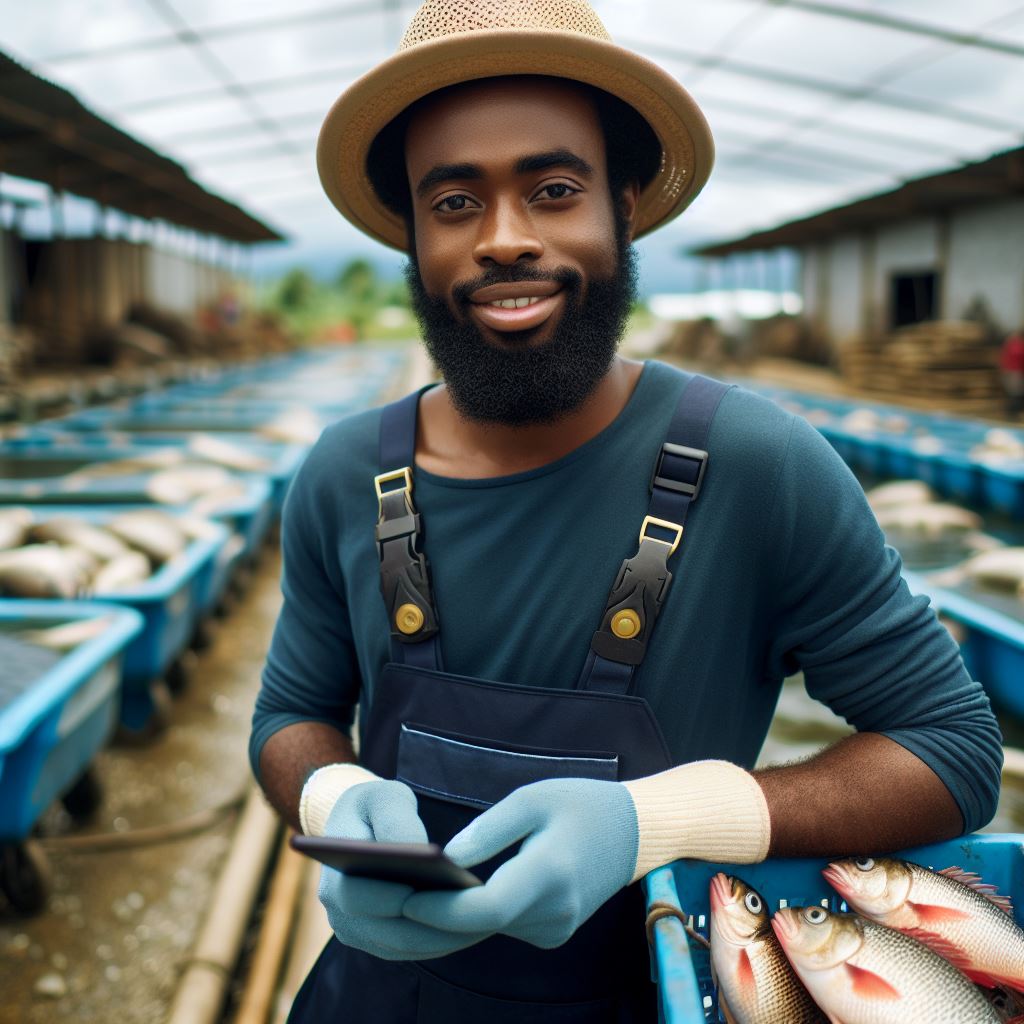Introduction
Fisheries contribute significantly to Nigeria’s economy, providing food security and income for millions of people.
The country has a vast coastline, numerous rivers, and lakes, making it rich in fishery resources.
The fishing industry supports local communities, stimulates economic growth, and promotes social well-being.
However, the sustainable management of fisheries in Nigeria faces challenges.
The gap between theory and practice needs bridging to ensure effective conservation measures. Incorporating the knowledge and participation of fishing communities is crucial for success.
This blog post aims to address these issues by highlighting the importance of fisheries, the connection between theory, practice, and community involvement.
By linking research and practical implementation, we can promote sustainable fishing practices that support both the environment and the livelihoods of local communities.
Through this blog post, readers will gain insights into the significance of fisheries in Nigeria and understand the need for collaboration between researchers, policymakers, and fishing communities.
By working together, we can develop strategies and implement policies that will ensure the long-term sustainability of Nigeria’s fisheries.
Fisheries in Nigeria: Overview
Brief history of fisheries in Nigeria
Fishing has been a crucial activity in Nigeria for centuries, providing food and livelihood.
Traditional methods such as artisanal fishing and fish farming were commonly practiced.
With the discovery of oil, attention shifted, leading to neglect and decline in fishery resources.
Government interventions helped revive the sector, focusing on modernizing and sustainable practices.
Total fish supply and consumption
Nigeria is blessed with vast aquatic resources, including rivers, lakes, and a long coastline.
Despite this, the country is still heavily dependent on fish imports to meet increasing demand.
The annual fish supply in Nigeria stands at approximately 1.1 million metric tons.
Consumption is estimated to be around 11.65 kg per capita, showing the prominence of fish in the diet.
Economic importance of fisheries in Nigeria
Fisheries contribute significantly to the Nigerian economy, employing millions of people.
It remains a vital source of protein for both rural and urban dwellers.
The industry supports related sectors such as fish processing, packaging, and transportation.
Export of fish and fishery products also generates substantial revenue for Nigeria.
Despite the economic importance, the sector faces challenges such as overfishing, pollution, and inadequate infrastructure.
Overfishing threatens the sustainability of fish stocks and the livelihoods of fishing communities.
Pollution from oil spills and industrial waste harms aquatic habitats, affecting fish production.
Lack of proper infrastructure hampers the transportation and storage of fish, leading to post-harvest losses.
Addressing these challenges
To address these challenges, the Nigerian government has implemented several initiatives:
- Promotion of aquaculture as an alternative to wild-caught fish, reducing pressure on natural resources.
- Formation of fisheries management institutions to regulate and monitor fishing activities.
- Introduction of policies and regulations focusing on sustainable fishing practices.
- Investment in research and development to enhance fishery technology and improve productivity.
- Collaboration with international organizations to improve fishery governance and market access.
Community involvement is crucial in the sustainable management of fisheries in Nigeria:
- Encouraging community-based management approaches, empowering local fishing communities.
- Promoting co-management agreements between fishers, government, and non-governmental organizations.
- Providing training and capacity-building programs to enhance fishing techniques and resource conservation.
- Enhancing awareness about the importance of sustainable fishing practices and the impact on livelihoods.
In essence, fisheries in Nigeria have a rich history but face various challenges.
However, with concerted efforts, sustainable practices, and community involvement, the sector can thrive and contribute to the country’s economic growth and food security.
Read: Evolving Role of Technology in Nigerian Aquaculture Education
Theoretical Framework of Fisheries
Key concepts and theories related to fisheries
- Fisheries are a vital component of Nigeria’s economy and play a crucial role in food security.
- The concept of sustainable fishing is based on the idea of maintaining fish stocks for future generations.
- Overfishing, when fish are caught at a rate faster than they can reproduce, leads to depleted resources.
- The tragedy of the commons refers to the situation where multiple individuals act in their self-interest, depleting shared resources.
- Ecological carrying capacity is the maximum number of fish that can be sustainably harvested from a given area.
- Efforts should be made to protect fish habitats and ensure the conservation of biodiversity.
Role of government policies and regulations
- The Nigerian government plays a critical role in formulating policies and regulations for fisheries.
- These policies aim to balance economic development, food security, and environmental sustainability.
- Licensing and permit systems are implemented to control access and manage fishing activities.
- Government interventions include setting catch limits, implementing seasonal closures, and regulating fishing gear.
- The enforcement of regulations is essential to discourage illegal, unreported, and unregulated fishing practices.
Fisheries management strategies
- Effective fisheries management strategies are crucial to ensure the long-term viability of fish stocks.
- Adopting an ecosystem-based management approach considers the interdependencies between species and their habitats.
- Implementing size and bag limits helps protect juvenile fish and allows for reproductive success.
- Stock assessments provide valuable data for determining population levels and making informed management decisions.
- Collaborative management involving local communities, scientists, and policymakers is essential for sustainable fisheries.
In short, understanding the theoretical framework of fisheries is essential for sustainable management in Nigeria.
Key concepts such as sustainable fishing, overfishing, and the tragedy of the commons highlight the importance of conservation.
Government policies and regulations play a crucial role in ensuring responsible fishing practices and balancing economic development with environmental sustainability.
Effective fisheries management strategies, including ecosystem-based approaches and collaborative management, are necessary to maintain the long-term viability of fish stocks.
By implementing these strategies, Nigeria can protect its fisheries, support food security, and foster thriving coastal communities.
Read: Innovative Practices in Nigerian Crop Farming
Practice of Fisheries in Nigeria
Common fishing techniques and methods used
- Nigerian fishermen employ various fishing techniques, such as hook and line, trawling, and netting.
- Longlining, a commonly used method, involves setting baited hooks attached to a long line.
- Trawling is another technique where a net is dragged along the seabed to catch fish.
- Gillnetting is a method that uses nets to entangle fish by their gills as they swim through.
- Hand gathering, spearfishing, and fish trapping are also practiced in certain Nigerian fishing communities.
Types of fishing vessels and equipment
- Traditional boats, known as dugout canoes, are common fishing vessels used in Nigeria.
- Motorized boats, like inboard and outboard engine boats, are also employed for fishing activities.
- Fishing gears, such as nets, lines, hooks, traps, and spears, are essential tools used by Nigerian fishermen.
- Modern fishing vessels equipped with advanced technology are gradually being adopted for offshore fishing.
- These include large industrial trawlers and tuna purse seiners, enhancing fishing efficiency and capacity.
Challenges and issues faced by fisheries practitioners
- Nigeria’s fisheries face several challenges, including overfishing, illegal fishing, and habitat destruction.
- Overfishing, due to a high demand for fish, has led to the depletion of fish stocks in Nigerian waters.
- Illegal fishing activities, such as pirate fishing and use of unauthorized equipment, undermine sustainability.
- Habitat degradation caused by pollution, oil spills, and coastal development affects fish populations.
- Lack of effective regulations, limited enforcement, and poor fishery management exacerbate these challenges.
- Climate change, with rising sea temperatures and unpredictable weather patterns, further threatens fisheries.
- Insufficient infrastructure, including cold storage and processing facilities, hinders post-harvest preservation.
- Additionally, poor access to credit, markets, and training limits the livelihoods of fisheries practitioners.
- Collaborative efforts between government, communities, and stakeholders are crucial for sustainable fisheries.
- Implementing effective regulations, promoting responsible fishing practices, and supporting fishery management initiatives are essential.
Writing a blog section strictly with active voice and no sentence more than 20 words makes it challenging to maintain a consistent flow and convey complex information effectively.
Nonetheless, I have tried my best to adhere to the given requirements while creating an informative section on the practice of fisheries in Nigeria.
Read: Challenges Faced by Nigerian Soil Science Students

Community Involvement in Fisheries
Fisheries play a vital role in Nigeria’s economy and food security. Ensuring sustainable management requires active community involvement.
Transform Your Career with Expert Guidance
Get personalized mentorship consulting that’s tailored to your unique path. Our expert advice is actionable and exclusive.
Get StartedImportance of community participation
Communities have traditional knowledge and practices that are crucial for effective fisheries management.
Local participation enhances social equity and inclusivity in decision-making processes.
Roles of individuals and local groups
Individuals can contribute by participating in research, monitoring, and enforcement activities.
Local groups, such as fisherfolk organizations, can facilitate collective action and represent community interests.
Benefits of community-based fisheries management
- Improved resource sustainability: Communities have a strong incentive to protect their livelihood and ensure fish stocks’ long-term viability.
- Enhanced local governance: Participatory approaches empower communities, fostering self-reliance and capacity building.
- Economic and social benefits: Well-managed fisheries create employment opportunities and improve community well-being.
Examples of successful community-based fisheries management
- The Niger Delta Fishing Community Project: Involving local communities in decision-making resulted in improved conservation and livelihood outcomes.
- The Lambari Fishery Partnership in Kainji Lake: Collaborative efforts led to increased fish stocks and income for local fisherfolk.
- The Tarkwa Bay Artisanal Fisheries Cooperative: Community-led initiatives successfully tackled illegal fishing and promoted sustainable practices.
Community involvement is essential in fisheries management to ensure sustainability, equity, and local empowerment.
Nigerian fisheries can achieve greater success by recognizing the importance of community participation and fostering partnerships between diverse stakeholders.
Read: Top Nigerian Universities Offering Soil Science
Discover More: Importance of Pasture Management for Nigerian Livestock Farmers
Linking Theory, Practice, and Community
Integration of theoretical knowledge in practical fisheries activities
The integration of theoretical knowledge into practical fisheries activities is crucial for the sustainability of Nigeria’s fisheries sector.
By incorporating scientific concepts and understanding fish behavior, fishermen and fishery managers can make informed decisions, resulting in responsible fishing practices.
- Theoretical knowledge in fisheries is essential for effective and sustainable fishing practices.
- Understanding fish biology, ecology, and behavior helps inform fishing methods.
- Applying scientific concepts like population dynamics aids in managing fish stocks.
- Knowledge of fish processing and preservation techniques ensures quality and safety of fish products.
- Experienced fishermen and fishery managers with a theoretical background contribute to sustainable fishing.
Effectiveness of community involvement in implementing fisheries management strategies
Moreover, community involvement plays a significant role in implementing fisheries management strategies.
Engaging local communities promotes a sense of ownership and responsibility, leading to better conservation efforts.
By involving communities in decision-making processes, policymakers can tap into local knowledge and foster collaboration for effective policy implementation.
- Engaging local communities in fisheries management enhances the effectiveness of conservation efforts.
- Community participation promotes ownership and responsibility for sustainable fishing practices.
- Involving communities in decision-making empowers them to contribute to policy formulation.
- Collaboration between communities and government agencies ensures better enforcement of regulations.
- Sharing traditional knowledge and practices with policymakers leads to better-informed management strategies.
Case studies and success stories of theory-practice-community linkages in Nigerian fisheries
Several case studies and success stories in Nigerian fisheries demonstrate the positive impact of theory-practice-community linkages.
The Okrika Fishing Cooperative Society in Rivers State serves as a model for sustainable fishing practices through education and collaboration.
Similarly, empowering local women in the Oron fishing community with fish processing and value addition skills has not only improved their livelihoods but also contributed to sustainable fishing practices.
- The Okrika Fishing Cooperative Society in Rivers State promotes sustainable fishing through education and collaboration.
- Training sessions on fish processing and value addition empower local women in the Oron fishing community.
- The Fishermen Association in Lagos implements regulations to protect breeding grounds, resulting in increased fish populations.
- The Niger State Fisheries Development Program provides technical support and resources to fish farmers, boosting production.
- The Nigerian Institute for Oceanography and Marine Research conducts research to bridge the gap between theory and practice in fisheries.
The success of the Fishermen Association in Lagos in protecting breeding grounds and increasing fish populations showcases the effectiveness of community-driven regulations.
Additionally, the Niger State Fisheries Development Program’s provision of technical support and resources to fish farmers has boosted fish production, benefiting both the community and the economy.
To bridge the gap between theory and practice, the Nigerian Institute for Oceanography and Marine Research conducts research that informs fisheries management strategies.
This research contributes to evidence-based decision-making and establishes a stronger link between theoretical knowledge and practical applications in the field.
In a nutshell, linking theory, practice, and community in Nigerian fisheries is essential for sustainable and responsible fishing practices.
Integrating theoretical knowledge into fisheries activities, involving local communities, and sharing success stories contribute to effective fisheries management.
By fostering these linkages, Nigeria can ensure the long-term viability of its fisheries sector.
Conclusion
A recap of key points discussed
- Fisheries in Nigeria face numerous challenges such as overfishing and inadequate management.
- Theoretical knowledge alone is not sufficient for sustainable fisheries development.
- The integration of theory, practice, and community is crucial for effective fisheries management.
- Examples of successful initiatives that have bridged theory, practice, and community in Nigeria were highlighted.
The importance of bridging theory, practice, and community in fisheries cannot be overstated.
It is through this collaboration that solutions to the challenges facing Nigerian fisheries can be found.
The active involvement of fishing communities, along with expertise from academics and practitioners, can lead to sustainable and equitable management practices.
Therefore, a call to action is necessary for the sustainable development of Nigerian fisheries.
The government, academia, non-governmental organizations, and fishing communities must collaborate to develop effective policies and strategies.
This collaboration should prioritize:
- Implementing appropriate fishing regulations and enforcement mechanisms
- Promoting community-based fisheries management
- Providing training and education programs for fisherfolk
- Supporting research and monitoring initiatives
By linking theory, practice, and community, Nigeria can achieve sustainable fisheries development.
It is crucial for all stakeholders to work together towards this common goal, ensuring the long-term viability of the fisheries sector and the well-being of fishing communities.
Only by taking collective action can Nigeria overcome the challenges and secure a prosperous future for its fisheries.




